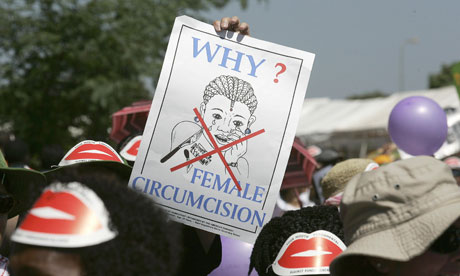

In engaging with countries on FGM, it is vital that at a policy level, DfID does not convey a sense of carrying 'colonial baggage' by treading on 'egg shells' on the issue. Instead, it should recognise that the campaign to eliminate FGM has already come a long way in Africa – from the 1980s when FGM was highly politically charged and was literally a 'no-go area' – to today when African women are speaking out for themselves against the practice and leaders are calling for a global ban.
With this new source of funding, the UK has positioned itself as a true global leader. However, it is not starting from scratch and should take the lead from Africa. The protocol of the African charter on human and peoples' rights on the rights of women in Africa, which is currently in force – spells out the comprehensive approach to address FGM and other forms of VAWG. It says states should take all necessary child protection, legislative and education measures to eliminate such practices and provide support to survivors. To achieve these objectives the African Union has declared 2010-2020 the 'Decade for African women'.
FGM prevalence has been falling among the young in some countries – albeit not as quickly as desired. According to recent demographic and health surveys data, Burkina Faso has seen a 27.5% reduction in FGM between older and younger women. The Burkina Faso model employs multiple strategies. The government has had an 'end FGM' policy since 1983 and continues to advocate strongly against the practice.
At national level, it has created a secretariat, which is government-funded, to oversee work on FGM. It has a specific law banning FGM, which is enforced. It uses a multiplicity of interventions by involving religious leaders, members of the police force, medical professionals, teachers, youth and women's organisations. This has ensured that messages on FGM are communicated to the wider public and included in development programmes.
The country has also focused on disseminating information through awareness campaigns by the police and army teams, information, education, and communication projects, media exposure and a free Child Line hotline for both the public to report suspected cases and for survivors or other affected parties to receive counseling. In addition to integrating FGM into reproductive health programmes, Burkina Faso is developing a specialist clinic to address the complications of FGM. It also provides up-to-date information on FGM to monitor and evaluate the progress.
The UK is now in a privileged position and can make real progress in the elimination of FGM and other forms of VAWG along with the eradication of extreme global poverty. The two objectives go hand in hand; in many ways, they are the same thing. If we move carefully, the development advances we can now make will provide long term benefits. However, it is essential that we follow Africa's lead and recognise successes where they are already taking place.
"DfID should focus on supporting existing programmes across Africa where countries are making progress in banning the practice of female genital mutilation " Efua Dorkenoo, OBE, is a Ghanaian campaigner against female genital mutilation (FGM). Efua is currently advocacy director of the FGM programme for Equality Now.
